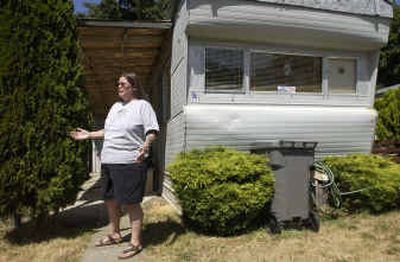Trailer park residents evicted

In two months, Dawn Arrington will make the final payment on her 44-year-old mobile home. A month later, it will be worthless.
Arrington and about 15 other tenants at the Coeur d’Alene Mobile Home Park recently learned they are being evicted. The trailer park has been sold, they were told. Arrington’s home, like some of the others in the park, has seen better days. Moving companies refuse to haul it to a new lot.
“I’ll probably just tack the title to the door and walk away,” Arrington said while standing under the shade of her fiberglass awning. “I was hoping to grow old and decrepit and fall apart with the trailer.”
Tenants say the 90-day eviction notice might have followed the letter of the law, but that doesn’t make it right. Many have been tenants for more than a decade.
Additional notice would have been nice, said Rick Bacon, who recently purchased a 1978 single-wide home across the dirt road from Arrington. Bacon, a custodian at a local nursing home, shares the home with his two toddler children. Moving the home to a new mobile home park will cost $1,250. That doesn’t include transporting the garden shed. And he’ll also have to leave behind his rose bushes and tomato plants full of green fruit.
“Give us a break. Don’t just put us in a corner here. Give us some options,” Bacon said. “I live hand to mouth like anyone else in this park.”
Lots are leased for $285 a month in the park, including water, garbage service and a septic system that tenants say is often backed up.
The Rental Connection manages the small park. Spokeswoman Sally Trutton said her company was just following orders passed along by an attorney for the new owners. Trutton said she couldn’t recall the name of the attorney or the new owners or what they planned to do with the land. She said the previous owner was D&S Investments, the officers of which could not be reached for comment Tuesday.
“I have no idea what their intentions are,” Trutton said. “We’re just the management company.”
Trutton blamed the situation on county and state laws, which she says make it difficult to move older mobile homes.
“They made it impossible for people of that income level,” Trutton said. “We have other parks. We’d be happy to assist them in trying to find other places.”
The state has a list of about a dozen safety requirements that must be fulfilled for manufactured homes built before 1976, said Rand Wichman, Kootenai County planning director. They must have a pitched roof, for example, and be placed atop a foundation. They also must have roofs capable of holding 40 pounds of snow per square foot.
The state also has laws against older, rickety mobile homes being moved.
“Some are unsafe to travel down the road because they have broken frames,” Wichman said.
Kootenai County does have a problem with low-income housing, Wichman said, but the problem is not rooted in onerous safety laws.
“The biggest obstacle for people is purchasing a lot, without a doubt. Land’s getting more expensive every day,” Wichman said. “It’s getting more and more difficult every day to find a lot in the country that they can afford. That goes for everybody. That’s the downside to the boom.”
There’s currently a 26-month wait for low-income rental assistance from the Idaho Housing and Finance Association, which administers federal grants, said Bette Woinowsky, an employee with the agency.
Arrington and Bacon don’t blame the safety laws or expect help from the government. They’re angry because they feel left in the lurch by their landlord. Bacon bought a trailer at the park only three months ago. Arrington has been living at the lot for six years, but only recently purchased her trailer. A bit of extra notice from the landlord or the new owners would have saved a lot of financial pain, they said.
“I’ve gone to their office multiple times,” Arrington said, referring to the rental agency.
“They’re just not talking to us. They’re not telling us anything except get out.”
Ditching her home and renting an apartment seems like the only option for Arrington. She has her eyes on one place that costs $425 a month, which is about half her take-home pay from a local nonprofit agency.
“Spokane’s going through their homeless thing right now,” she said. “Well, this is how it all starts.”